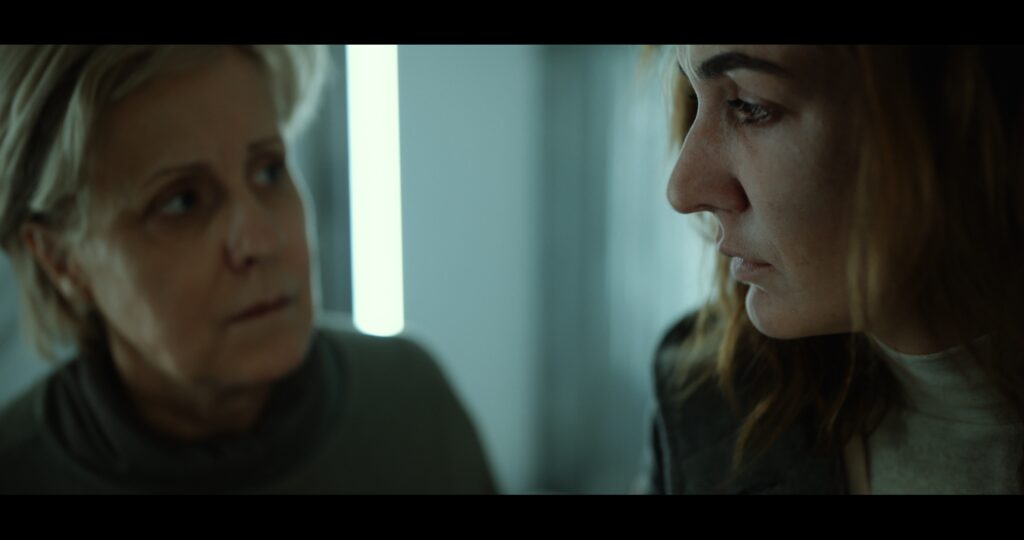Photo: laluzportraits
Marianne Farley is a director/screenwriter, producer, and actress from Montreal, Canada. Her second critically acclaimed short film MARGUERITE won over forty awards around the globe and earned an Academy Award® nomination for Best Live Action Short Film in 2019. Marianne is in the post production phase of her first feature film NORTH OF ALBANY (co-written with Claude Brie). Her experience as an actress drives every decision she makes as a director. Marianne also produced LES NÔTRES by Jeanne Leblanc in which she plays one of the lead roles. Through her production company SLYKID & SKYKID she is also developing the feature films LA FAUCHE (written by Camille Trudel) and À DEMI- SOUPIR (co-written with Claude Brie). FRIMAS premiered at the Oscar qualifying festival Regard, then it went on to screen at Off-Courts Trouville, Flickers’ Rhode Island International Film Festival, and can soon be seen at Mill Valley Film Festival, Cinéfest Sudbury in Ontario, Thessaloniki International Short Film Festival, Festival International du Film Francophone de Namur, Miami Short Film Festival, Show Me Shorts and Asiana International Short Film Festival.
Ô Films is a Montreal-based production company founded by Sophie Ricard-Harvey and Charlotte Beaudoin-Poisson, which specializes in developing and producing projects by filmmakers whose vision stands out locally and internationally. The strikingly beautiful cinematography of FRIMAS was crafted by Benoit Beaulieu.
FWM: You began your career as a singer and pursued acting. What has been your favorite role?
I enjoy and learn from every role that I undertake. However, my first lead in a feature film (WHITE SKIN) is probably the one that is the most special to me. In this French Canadian horror film, directed by Daniel Roby, I played the role of Claire, a young woman who suffered from cancer and was emotionally distant from all those she encountered. What the audience would eventually come to realize was that Claire was in fact a succubus and that she was letting herself get sick because she refused to feed on humans. Although WHITE SKIN was a genre film, this was a role with depth and complexity and it allowed me to uncover new parts of myself. It was a unique experience that I learned a great deal from.
FWM: You directed your first short in 2014, RANSACK (SACCAGE) and in 2017, MARGUERITE (Nominated for best live action short film at the Oscars in 2019). How have you evolved as a director?
Each project provides opportunities in discovery about directing but also about myself. Whether it’s identifying mistakes from which I can learn from, developing my technicals skills or improving my ability to inspire and pull out the best in each actor, I am always excited, totally committed and grateful. Each project challenges me differently and therefore increases my scope as a director and as a human being.
FWM: As a true lover of the seventh art, how important is filmmaking to social change?
I believe that filmmaking is essential to social change. Films are present in one form or another in every household and in most countries. This offers a unique and global access to information and to various cultures. Films offer the unique opportunity to present in a powerful way the vision and experience of communities that may be different or underrepresented in our every day life. The combination of new cinematographic technologies and the skills sets of amazing actors allows filmmakers a great deal of flexibility and creative choices to convey the message they want to share. Every individual is invited into these alternative realities and therefore can feel empathy and even be moved into action.
About FRIMAS: This timely tale follows a woman who is forced to take unthinkable risks to end her pregnancy in a country where abortion is banned.
When getting an abortion has once again become a criminal offense, Kara is confronted by a grim and brutal reality. Even though obvious dangers are at play, she seeks out the services of an illegal mobile abortion clinic. Once inside the meanders of this morbid clinic, she is faced with devastating repercussions.
FWM: Tell us about your new film, FRIMAS. What was critical to translate the emotions of the character as a director?
The choice of the actress was the most critical aspect in translating the emotions to the screen. Karine Gonthier-Hyndman auditioned for the part and she was phenomenal, very raw. This was her first dramatic role; she is renowned as a comedic actress.
We developed a wonderful synergistic relationship during the shoot. Sharing the same values and a similar emotional response to the issue at hand definitely helped us figure out how to convey the emotions of the character. She has the ability to express with few words and with restrained intensity the power of her fear, sadness and panic. I loved working with her.

FWM: The word Frimas means Frost. What is the significance of this title?
Choosing a title is never easy. In the case of Frimas, we were looking for something simple that would suggest the bleak and harsh aspect of the theme but would still be somewhat poetic. “Frimas” means a cold, thick fog that freezes as it falls. We felt that the title perfectly describes the current situation in regards to women’s rights. We collectively think we’ve made great gains in gender equality, but the more we move forward, the more we realize how fragile those are. Overnight, we could take a big step backwards and lose many of our precious rights, including the right to abortion.
FWM: The film captures the often-overlooked stories of real women. Why was this story important to you?
As far as I can remember I’ve been passionate about human rights, and, as a woman, I am particularly committed to protecting women’s rights. After MARGUERITE which delved on LGBTQ issues, I wanted to address with FRIMAS the threats that women’s right to an abortion were facing worldwide. In the US as witnessed recently in Mississippi, Texas and in many other states, legislatures are moving aggressively to repeal Roe vs Wade either directly by bringing the issue to the Supreme Court or indirectly by stripping away at the existing laws. The bottom line is that women’s rights are definitely in danger and have been so for the last several years. I wanted to draw attention to what illegal abortions could look like and to the level of trauma they could generate in the future.

FWM: FRIMAS gives space to critical thinking that might affect social change. What is your mission for the film?
I wanted to approach the discussion on abortion rights from the perspective of a woman who undergoes the procedure in a highly repressive society. The traumatic reality for a woman who chooses for very personal reasons to terminate a pregnancy and the trauma that she will endure if this medical act is driven underground is probably something that most of us could relate to. I felt that in order for us to come to some common consciousness on this perspective, the story had to be told.
My main character is carrying a child that won’t survive after birth. This is a decision she didn’t come to lightly but for her it’s inevitable. There is a case to be made for every women’s anguish when choosing such a medical procedure. It is never a decision that women come to lightly. There are circumstances physical, emotional and financial in nature that drive women to make this very difficult decision. Every woman who makes that choice deserves our understanding and compassion. I wanted to present the anguish of my character’s situation compounded by the trauma caused by an uncaring social environment in the hope that it would generate compassion and understanding.
FWM: Please share your upcoming films.
I recently completed the post-production of my first feature film NORTH OF ALBANY. It should be released in the fall of 2022. I am also developing two feature films. LA FAUCHE and À DEMI SOUPIR. Both will be produced through my production company Slykid & Skykid. Finally, I’m collaborating on a few other projects with independent producers but I can’t divulge any information on those at this time.


